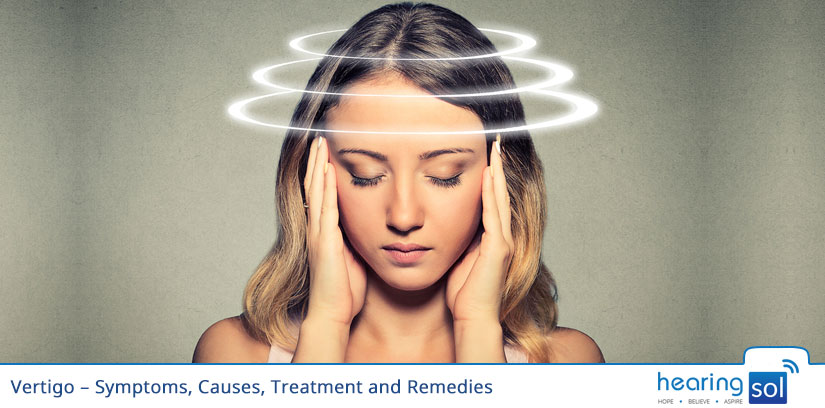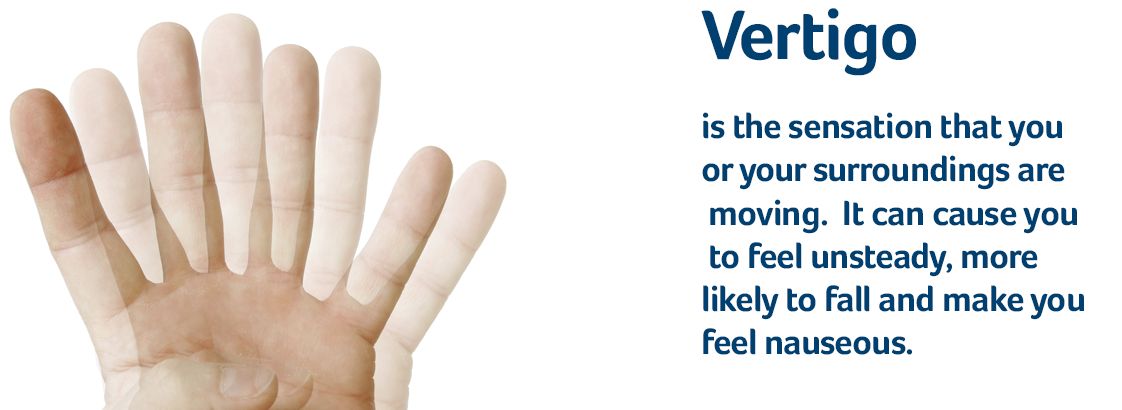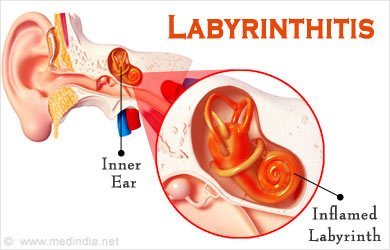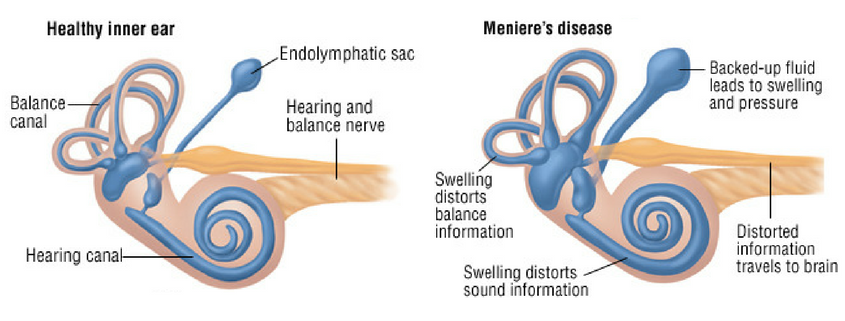
Vertigo, also commonly referred to as dizziness, is a term that is primarily used to describe a range of inner ear sensations in the affected individuals, such as feeling faint, whirling, weak or unsteady.
You can purchase the latest hearing aids at a fair price through HearingSol, If you need any assistance or you have a query regarding Vertigo and Hearing Loss, feel free to call us at +91-9327901950. We are always here to help you.
Let’s discuss all factors and conditions related to Vertigo in detail.
What is Vertigo?
Vertigo creates a false sense that the person suffering from vertigo or often feels that he/she or the surroundings around them is spinning or moving. It is one of the more common reasons that adults experience more than their young ones.

In such a situation, frequent spells or constant vertigo may significantly affect your life, but this rarely signals a life-threatening condition. Its treatment and effectiveness depend largely on the causes and symptoms.
Types of Vertigo
There are mainly two types of vertigo:
- Peripheral Vertigo is caused by a problem in the vestibular nerve, which is used to connect the brain and the inner ear and it is also the most common type of vertigo.
- Central Vertigo occurs when there is a glitch in the brain, particularly in the cerebellum. It can also cause by dysfunction of the central nervous system.
Symptoms of Vertigo
Generally, people who suffer from vertigo show many different symptoms such as:
- A false sense of spinning
- Feeling floating or swimming
- Feeling faint or light-headedness
- Unsteadiness
- Loss of balance
- Double vision
- Difficulty swallowing
- Facial paralysis
- Difficulty in the movement of eyes
- Slurred speech
These feelings may be triggered or worsened through bodily movements like walking, standing up, or moving your head around.
Dizziness or vertigo may be accompanied by nausea. Sometimes, it may become so severe that you are forced to sit down or lie down and the episode may last from a few seconds to a couple of days.
Causes of Vertigo
Vertigo has many possible causes, including disturbance in the inner ear, motion sickness, medicinal effects, etc.
At times, vertigo is also caused by an underlying health condition like poor blood circulation, infection, trauma, or another injury.
The way you feel actually provides clues for possible causes, including how long the effect of vertigo lasts and other symptoms you might have may also point to the cause.
Apart from these, there are some major causes of vertigo-like Meniere’s disease, Labyrinthitis, Migraine, and Benign Paroxysmal Positional Vertigo (BPPV).
Let’s take a brief look at these major causes of vertigo in individuals.
Labyrinthitis
-

- Inflamed Labyrinth
Labyrinthitis is a viral infection of the vestibular nerve, which is also known as vestibular neuritis, has the tendency to cause intense and constant vertigo or dizziness in individuals.
During this condition, the person feels irritation and swelling, which is caused by an infection or virus in the inner ear. If you also experience sudden hearing loss, then you may have labyrinthitis.
Meniere’s Disease
-

- Normal ear VS Meniere’s diseased ear
This disease involves the excessive build-up of fluid in your inner ear. It is usually characterized by sudden episodes of vertigo lasting for several hours.
An individual suffering from Meniere’s disease may also experience intermittent loss of hearing, ringing or booming sensation in the ear (Tinnitus) and having your ears clogged due to air pressure or weather conditions.
Migraine
Individuals who experience migraines may have episodes of vertigo or other similar types of dizziness, even when they are not experiencing a severe headache.
Such episodes usually last from a few minutes to a couple of hours and may also be associated with a headache as well as sensitivity from light and noise.
Benign Paroxysmal Positional Vertigo (BPPV)
Benign Paroxysmal Positional Vertigo (BPPV) is one of the most common causes of vertigo or dizziness in individuals. This condition causes an intense but a false sense of episodes that the individual is spinning or moving, or perhaps, it is the surrounding that is spinning around him or her.
These episodes are triggered by a rapid change in the movement of the individual’s head, such as when he or she turns their head over in bed, sits up, or experiences a strong blow to the head.
Other Problems That Cause Vertigo
Individuals may feel dizzy or faint if the heart is not pumping enough blood to the brain. Other causes may include:
- Poor blood circulation – Blood circulation plays a big role Conditions like cardiomyopathy, cardiac arrest (or heart attack), heart arrhythmia and transient ischemic attack could contribute to the cause of vertigo or dizziness. A decrease in the blood volume may cause inadequate blood flow to your brain and the inner ear. This may lead to problems. So always try to improve your blood circulation.
- Drop in the blood pressure – A dramatic drop in the blood pressure may result in brief light-headedness or a feeling of fainting in individuals. It usually occurs when the individual tries to sit or stand quickly.
- Low blood sugar (hypoglycemia) – Generally, this condition occurs in individuals with diabetes and the use of insulin. It may be followed by sweating and anxiety.
- Anxiety disorders – Certain anxiety disorders may cause vertigo followed by panic attacks and the fear of being in large, open spaces (also called agoraphobia).
- Neurological conditions – Some neurological disorders like Parkinson’s Disease and multiple sclerosis can lead to progressive loss of balance in the inner ear.
- Low in iron levels (anemia) – Other signs and symptoms that may occur when experiencing vertigo include anemia, fatigue, weakness, and pale skin.
- Dehydration – If you do not drink enough water or fluids, you may feel dizzy due to dehydration.
- Cholesteatoma – This condition is known by unusual skin growth in the middle ear, behind the eardrum. It is caused by a continuous ear infection.
- Otosclerosis – Otosclerosis causes unusual bone growth in the middle ear that can also cause hearing loss.
- Acoustic neuroma – Acoustic neuroma is a tumor that develops on the main nerve that leads from your inner ear to your brain.
- Multiple Sclerosis – People who are having Multiple sclerosis can experience vertigo episodes at some points.
- Pregnancy – Vertigo and dizziness may occur during pregnancy because of hormone changes, low blood sugar levels, pressure on blood vessels, or the baby pressing the vein that carries blood to the heart.
- Air Pressure Changes – When diving underwater or flying in an airplane, pressure differences between the middle ear are usually experienced. This may cause Alternobaric vertigo.
- Allergies – Some people have vertigo episodes when they exposed to few allergens like dust, molds, dander, or foods.
Risk Factors For Vertigo
The common risk factors which may be involved with vertigo in individuals include:
- Having an ear infection
- Past episodes of dizziness
- Inherited vertigo from a family member
- Experiencing high levels of stress or in a state of depression
- Taking certain drugs like anti-depressants or antipsychotics
- Individual’s age is over 50 years old
- Consumption of alcohol
- Having medical conditions affecting the balance of your ears
- Suffering a head or neck injury
Vertigo Diagnosis
A doctor might try to diagnose vertigo by finding out if there is any problem in the inner ear, through a physical examination and they might also ask you questions like how your vertigo makes you feel.
Your doctor might also ask about your medical histories like migraine headaches, head injury, or ear infection. This will help the doctor to find out what kind of vertigo you have.
Vertigo Treatment
Almost every time vertigo resolves without treatment however any underlying problem might need medical attention.
For instance, a bacterial infection that will need antibiotic therapy. Antihistamine or anti-emetics can be used to lower nausea and motion sickness.
In some rare cases, a patient with an intractable benign paroxysmal position vertigo (BPPV) is treated through surgery in which the surgeon placed a bone plug into the inner ear to block the area where vertigo has been triggered.
While there are various remedies you can try at home to get rid of vertigo.
Home Remedies for Vertigo
Following are some steps you can try at home to resolve vertigo and limit its impact on daily life:
- Sit down as soon as you feel dizzy
- Slow down on movements that usually makes you feel its symptoms
- Use good or medium bright lighting while getting up at night
- Take Ginkgo biloba which is a herb that manages blood flow to the brain
- Drink ginger tea more
- Eat almonds
- Stay Hydrated
- Use apple cider vinegar and honey together
- Use essential oils like Peppermint, lavender, and lemon essential oil.
- Do acupressure
Conclusion
Vertigo can increase your risk of falling and injuring yourself. Experiencing vertigo or dizziness while driving or operating heavy machines are dangerous and may increase the likelihood of fatal accidents.
If your vertigo symptoms keep coming back now and again for more than 1 week than you should immediately concern a doctor.
If vertigo is caused by an infection/inflammation than antibiotics may reduce swelling and cure the infection. But if it is caused by a more serious problem like tumor or injury to head or neck than surgery may be needed for treatment.
You can purchase the latest hearing aids at a fair price through HearingSol, If you need any assistance or you have a query regarding Vertigo and Hearing Loss, feel free to call us at +91-9327901950. We are always here to help you.

 Reviewed by Mr. Ranjeet Kumar
Sr. Audiologist, Speech Therapist & Cochlear Implant Specialist, BASLP on
Reviewed by Mr. Ranjeet Kumar
Sr. Audiologist, Speech Therapist & Cochlear Implant Specialist, BASLP on